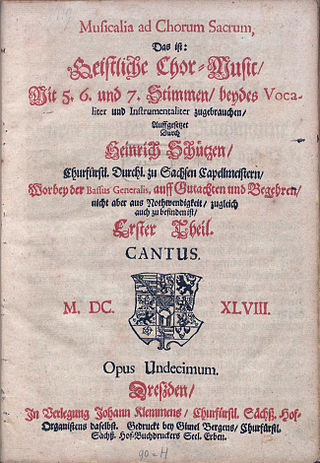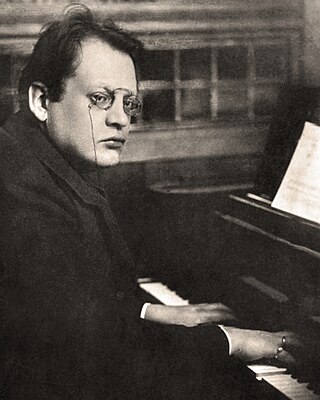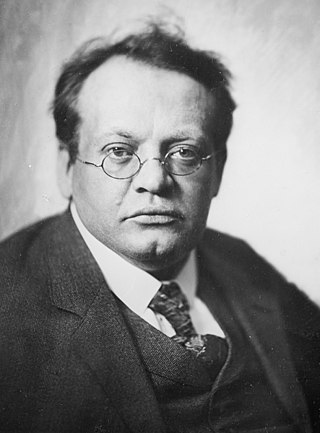
Johann Baptist Joseph Maximilian Reger was a German composer, pianist, organist, conductor, and academic teacher. He worked as a concert pianist, as a musical director at the Leipzig University Church, as a professor at the Royal Conservatory in Leipzig, and as a music director at the court of Duke Georg II of Saxe-Meiningen.
Michael Denhoff is a German composer and cellist.
Karl Julius Marx was a German composer and music teacher.

Max Reger's 1915 Requiem, Op. 144b, is a late Romantic setting of Friedrich Hebbel's poem "Requiem" for alto or baritone solo, chorus and orchestra. It is Reger's last completed work for chorus and orchestra, dedicated in the autograph as Dem Andenken der im Kriege 1914/15 gefallenen deutschen Helden.

The Reger-Chor is a German-Belgian choir. It was founded in Wiesbaden in 1985 and has been conducted by Gabriel Dessauer in Wiesbaden. Since 2001 it has grown to Regerchor-International in a collaboration with the organist Ignace Michiels of the St. Salvator's Cathedral of Bruges. The choir performs an annual concert both in Germany and Belgium of mostly sacred choral music for choir and organ. Concerts have taken place regularly in St. Bonifatius, Wiesbaden, and in the cathedral of Bruges in its series "Kathedraalconcerten". The choir performed additional concerts at other churches of the two countries and in the Concertgebouw of Bruges.

Geistliche Chormusik is a collection of motets on German texts for choir by Heinrich Schütz. It was printed in Dresden in 1648 as his Opus Undecimum, and comprises 29 individual settings for five to seven voices, which were assigned numbers 369 to 397 in the Schütz-Werke-Verzeichnis (SWV). The original title was Geistliche Chor-Music, Erster Theil which indicates that Schütz planned a second part. It is also known as Geistliche Chor-Music 1648. The collection contains earlier and new works and a German arrangement of a motet by Andrea Gabrieli.

Vexilla regis, WAB 51, is the final motet written by the Austrian composer Anton Bruckner.

Tantum ergo, WAB 42, is a setting of the hymn Tantum ergo composed by Anton Bruckner in 1846.

Inveni David, WAB 19, is a sacred motet composed by Anton Bruckner in 1868.

Der 100. Psalm, Op. 106, is a composition in four movements by Max Reger in D major for mixed choir and orchestra, a late Romantic setting of Psalm 100. Reger began composing the work in 1908 for the 350th anniversary of Jena University. The occasion was celebrated that year with the premiere of Part I, conducted by Fritz Stein on 31 July. Reger completed the composition in 1909. It was published that year and premiered simultaneously on 23 February 1910 in Chemnitz, conducted by the composer, and in Breslau, conducted by Georg Dohrn.

Unser lieben Frauen Traum Op. 138, No. 4, is a sacred motet for unaccompanied mixed choir by Max Reger. The German text is a poem by an anonymous poet, derived from a Volkslied. The piece is in F major and scored for up to six voices, SSATBB. Composed in Meiningen in 1914, it was published in 1916 after Reger's death as the fourth of Acht geistliche Gesänge. It is often performed in Advent.

Nachtlied Op. 138, No. 3, is a sacred motet for unaccompanied mixed choir by Max Reger. The German text is a poem by Petrus Herbert, beginning "Die Nacht ist kommen". The piece is in B minor and scored for five voices SATBB. Composed in Meiningen in 1914, it was published in 1916 after Reger's death as the third of Acht geistliche Gesänge.

Der Einsiedler Op. 144a, is a composition for baritone soloist, five-part choir and orchestra by Max Reger, written in 1915. The German text is a poem by Joseph von Eichendorff, beginning "Komm' Trost der Welt, du stille Nacht". The composition was published in 1916 after Reger's death by N. Simrock, combined with the Hebbel Requiem, as Zwei Gesänge für gemischten Chor mit Orchester, Op. 144.

Geistliche Gesänge, Op. 110, are three motets by Max Reger. He composed them between 1909 and 1912:

Abendlied, Op. 69/3, is a sacred motet by Josef Rheinberger for a six-part mixed choir (SSATTB). It has been regarded as his best-known sacred composition. He wrote the first version in 1855 at the age of 15.
Helmut Kahlhöfer was a German church musician and academic teacher. He was the founder and for decades the conductor of the choir Kantorei Barmen-Gemarke.
Johannes Weyrauch was a German composer and cantor.

Carl Josef Thiel was a German organist, church musician and professor of music.
In music, Op. 138 stands for Opus number 138. Compositions that are assigned this number include:












